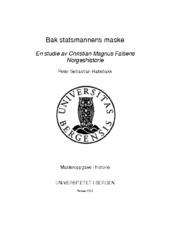| dc.description.abstract | In this study, I analyze the main historical work of the «Father of the Norwegian Constitution», Christian Magnus Falsen's (1782-1830) Norgeshistorie. The Norgeshistorie, published in 1823-4, is Falsen's main historical and literary work, and the first «History of Norway» written after the country became independent in 1814. It was damned by the faint praise of Peter Andreas Munch in the early 1850s, and has received scant attention ever since the influential historian of the Norwegian Historical School published his own work on the history of Norway. To the extent that there has been a scholarly reception of the work, it has been understood as a stylistically elegant piece based on weak methodology, written by a brilliant man who failed to achieve his potential, and a romantic tract which added nothing to the late Danish-Norwegian 18th century classicist historiography. The tensions inherent in this view are obvious. My point of departure was to attempt to situate Falsen between classical republicanism and German romantic idealism, as Falsen is known to have read political theorists and historians in both schools. I found that while Norgeshistorie is built up as a narrative history, its emphasis is on statecraft and the mechanics of political power, as opposed to the actual course of Norwegian history. I demonstrate that Falsen selectively uses sources drawn from a fairly wide range of historians to create a narrative of Norwegian decline and fall in the Middle Ages. The main driving force in Falsens Norgeshistorie is the statecraft of kings, queens, Odelsmenn and ecclesiastical princes, which plays out beneath a superstructure consisting of the paradigmal shift in popular virtue from paganism to Christianity. As a consequence, I argue that Falsen's four-volume history should be judged as a subtle work of political theory, a rather late Speculum of Princes, not as a history - which on close inspection is what Falsen declares to be his intention in his dedicatory poem and introduction. Certain words in Falsen's vocabulary recall German idealism, but the main concepts and didactic nature of Falsen's tract are firmly entrenched in classical learning, and draw particularly on Cicero. While the work is ambiguous and merits further study, the configuration of classical commonplaces on the statesman and popular virtue in Norgeshistorie indicate, surprisingly, that Falsen's virtue was pagan, and his statecraft Machiavellian. | en_US |
